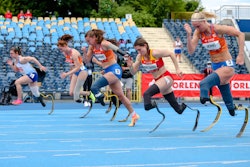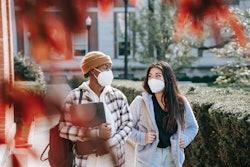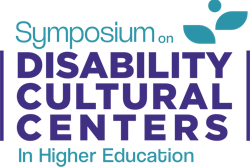During her 12 years at San Francisco State University’s (SFSU) Paul K. Longmore Institute on Disability, Interim Director Dr. Emily Beitiks has tried to honor the legacy of the institute’s late founder and namesake. Longmore, an SFSU history professor who made major contributions to the field of disability studies, “beautifully wore [two] hats — bringing his activist work into his work as a scholar,” Beitiks said.
So, when Beitiks learned in 2022 that the Andrew W. Mellon Foundation was accepting grant proposals for disability studies projects, she eagerly submitted one for a fellowship program designed to cultivate the work of disabled scholar-activists. The first year of that program, known as the Emerge Fellowship, just concluded, and the second of three years funded by a $1 million Mellon Foundation grant will begin this month. Bowen Cho
Bowen Cho
Beitiks opened fellowship applications in January 2023 to early-career scholar-activists with project proposals related to disability studies or disability justice. Fellows receive mentorship and $10,000 in project funding. Beitiks and three panelists selected the first cohort of 11 fellows — all queer or transgender, mostly people of color — from more than 300 applicants. The selection committee prioritized selecting a diverse cohort and elevating projects targeting communities not normally represented in the heavily white disability studies field.
“The competitive applicants were considering disability justice from an intersectional lens,” said certified rehabilitation counselor Alexander Locust, the Emerge Fellowship’s program director. “Not just a single issue, but ‘How are Black and brown disabled people more impacted? How are queer Black and brown disabled people? How are multiple marginalized disabled folks at the center?’”
The first cohort of fellows — whose projects ranged from a first-of-its-kind campus accessibility ranking to a digital zine examining the intersection of anti-Blackness, fatphobia, ableism, and incarceration — gathered at SFSU for a month-long workshop in July 2023. Throughout the following 10 months, the fellows participated in meetings with their faculty mentors and optional monthly cohort-wide calls to discuss their progress.
One of the fellows, Bowen Cho, had been attempting to complete their project since early 2020, but had struggled to find collaborators — as disabled scholars often do, they said. Cho earned a bachelor’s degree in psychology and a master’s in political science after more than a decade of entering and withdrawing from several universities because of mental health and accessibility concerns. Their web-based project, Neurodivergent-U, is an accessibility ranking of 89 U.S. universities using data provided by around 250 surveyed students.
The study’s measures included whether all campus buildings were accessible to people with mobility aids and whether each school had a “students of concern” program that deputized campus community members to police student behaviors. Such programs are pseudoscientific and can do more harm than good to neurodivergent students and those with mental illness, Cho said. Cho, who published a report on their findings in February, was surprised that several elite private universities with “very cut-throat types of cultures,” including Harvard, Dartmouth, and the University of Chicago, ranked at the top, they said.
“But it's important to keep in mind that the highest score in the rankings was a D,” Cho said. “So, there's really a lot more that many universities can be doing to support their students.”
In addition to Neurodivergent-U, Cho created two other websites during their fellowship year: a webcomic showcasing student experiences with students of concern programs and a media watchdog site targeting ableist narratives in the news. Their work would not have been possible without the Emerge Fellowship, they said.
“A lot of faculty see us as people not worth investing in,” Cho said. “So for me to have [Beitiks’] mentorship — as a disabled person, I don't like measuring myself in terms of productivity, but I was so productive in the time I've been working with [her]. It was such a new experience to have somebody actually interested in the things I was writing and to give me feedback as if the work I was doing mattered. I think that's why things like Emerge are so important — that valuing of the contributions disabled scholars can make is not something we usually experience.”
The first year of the fellowship had rocky moments, especially during the workshop, Beitiks and Locust said. The dorms on the SFSU campus weren’t fully accessible. The schedule quickly proved taxing, overpacked with guest lectures and not inclusive of enough rest or rapport-building time. Although many of the fellows bonded, painful disagreements about how to appropriately center anti-Blackness in the cohort’s work divided some and led to group discord. Two fellows left the program early; a few others chose not to participate in the monthly cohort-wide check-ins that followed the workshops.
“One of the things that felt like a big lesson from the first year is that…they're all individuals,” Locust said. “I would love to offer an overarching takeaway for the cohort, but I feel like each person had their own experience. It was very clear that some people had made positive connections with people they wouldn't have met before and were excited to be in community after the experience. It’s very clear that some people didn't feel connected at all.”
Throughout the month, the program staff altered the schedule in response to the fellows’ requests for more cohort-only time. Locust and a third-party mediator held listening sessions and facilitated the fellows’ efforts to process their feelings and sort out their group dynamics.
Beitiks and Locust said they have used the extensive feedback the first fellows gave to make changes that will positively impact the incoming cohort’s experience. This summer’s workshop will consist of one in-person week primarily focused on relationship-building, a week of rest and three weeks of virtual meetings. The in-person week will be held off campus at a hotel with beds more comfortable than those available in the dorms. Last year’s third-party mediator will join the program staff and hold weekly office hours, attempting to proactively address conflicts.
“We did encounter a lot of hurdles in year one, and we're really growing from those mistakes,” Beitiks said. “We feel incredibly grateful to our year one cohort for the work of learning with us together and sharing about their experience…But we also saw that it works. People developed relationships they wouldn’t have had access to and received mentorship…And the opportunity to have these funds given to support work they weren't finding funding for elsewhere was an important boost to their future commitment to the field.”




















